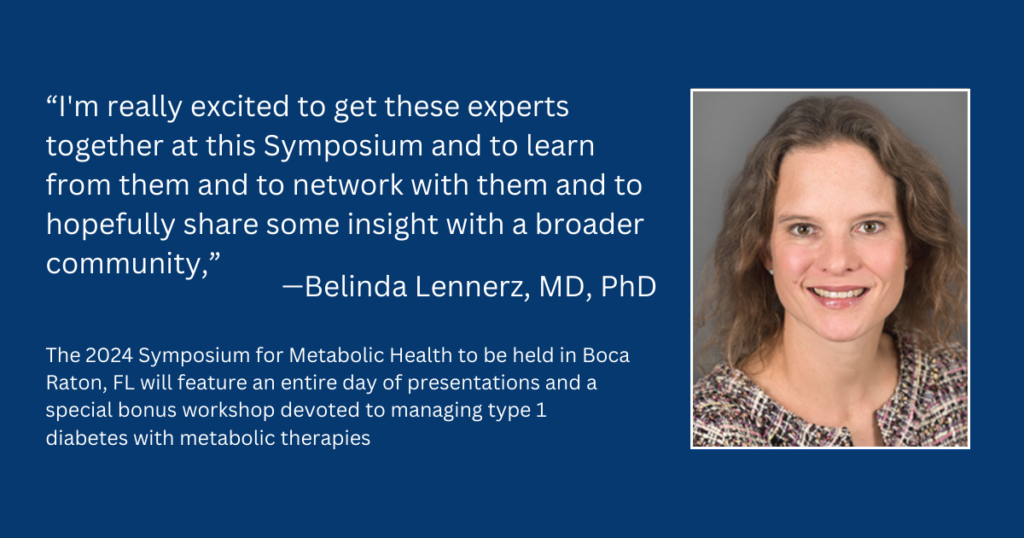Dr. Belinda Lennerz enthusiastic about bringing together expert clinicians and researchers to advance the science
Enthusiasm is growing for the upcoming 8th Annual Boca Symposium for Metabolic Health (January 12-14, 2024), which will feature a special bonus workshop and full day of presentations devoted to exploring how metabolic therapies, such as low-carbohydrate, ketogenic diets, can improve the management and reduce the risk of complications in outcomes of type 1 diabetes.
We recently had the chance to speak with Belinda Lennerz, MD, PhD, a leader in the fields of pediatric endocrinology and diabetes, who is participating in the planning of this event with a first-time focus on type 1 diabetes. Dr. Lennerz is an attending physician at the Boston Children’s Hospital Division of Endocrinology and an assistant professor of pediatrics at Harvard Medical School.
Dr. Lennerz shed light on some of the developments in her field, as well as the challenges and opportunities facing both practitioners and patients. According to Dr. Lennerz, “there really isn’t a great deal of research, and there really isn’t a lot of medical guidance or understanding in the medical community” when it comes to using low-carbohydrate diets for the management of type 1 diabetes.
At the recent Symposium for Metabolic Health held in San Diego this past August, Dr. Lennerz delivered a presentation titled “Published Research on Carnivore, Ketogenic and Carbohydrate Restricted Diets.” During her presentation, she shared a wealth of information that provides reason for optimism for those wanting to manage their type 1 diabetes using metabolic therapies, including low-carb, ketogenic diets.
She discussed the limitations of traditional nutrition research methods, such as randomized controlled trials (RCTs), in capturing the long-term impacts of diet. She urged the need for a more varied portfolio of rigorous scientific studies to truly understand the dietary complexities related to diabetes management.
She’s hoping the groundbreaking focus on type 1 diabetes at the upcoming Symposium in Boca helps build even more momentum and interest among both practitioners and laypeople who are not content with the status quo with respect to the way type 1 diabetes is currently managed.
“I’m really excited to get some of these people together at this Symposium and to learn from them and to network with them and to hopefully share some insight with a broader community,” Dr. Lennerz added.
Despite grassroots interest from patients participating in Facebook groups and advocacy organizations, Dr. Lennerz emphasized that “there is really a very small number of people in the world that are working on this from a scientific and professional standpoint.”
She believes an event like the Boca Symposium could significantly help change that landscape.
The Symposium in Boca will offer a special bonus workshop on Thursday afternoon, January 11 (RSVP required), and an entire day of the Symposium itself will be devoted to presentations on the topic of type 1 diabetes.
In her San Diego presentation, Dr. Lennerz shared insights from her observational study involving 300 adults and parents of children with type 1 diabetes. The study found promising results in glycemic control, and she suggested that a multifaceted approach to diabetes management, incorporating lifestyle changes, could be more effective than relying solely on medication or technology.
Lennerz also discussed the carnivore diet, revealing intriguing results from her collaborative survey that was conducted in partnership with Dr. Shawn Baker. Participants on this diet reported significant health improvements, challenging conventional wisdom about nutritional needs. She cautioned that these results were self-reported but expressed optimism and advocated for rigorous scientific research in this area.
The overarching theme of her presentation was that managing type 1 diabetes is a complex challenge requiring a multifaceted approach. She emphasized that both healthcare providers and patients need to broaden their understanding and approach to treatment, considering both lifestyle choices and emerging research findings.
The board of the Society of Metabolic Health Practitioners (The SMHP™), a non-profit organization advocating for evidence-based nutritional approaches to metabolic health, has spent the past year meticulously compiling research and clinical outcomes related to type 1 diabetes. They are in the final stages of releasing a consensus statement that aims to provide comprehensive guidance in this emerging field. Stay tuned for its much-anticipated release.
The upcoming Symposium presents a unique opportunity for collaboration and advancement, something Dr. Lennerz ardently supports. “Especially when it’s such a small field that I often feel like I’m practicing or in a vacuum,” she said. “Some people have a lot more clinical experience than I do; I have more research experience than some others. Bringing that together at one table, I think, is a great catalyst for ideas.”
As for advice to other practitioners, Dr. Lennerz is clear: “Keep an open mind and network as much as you can with people who have experience, as there are no published guidelines on this.”
“The first step is small proof-of-principl.e studies, and then hopefully there will be larger randomized control trials with many people for many months or years to really get a good sense of the full picture,” she stated regarding future research.
As the urgency for innovative type 1 diabetes management intensifies, Dr. Lennerz believes that symposiums like this one can be pivotal in revolutionizing patient outcomes for those battling type 1 diabetes.
Learn more about the Symposium for Metabolic Health and register here



